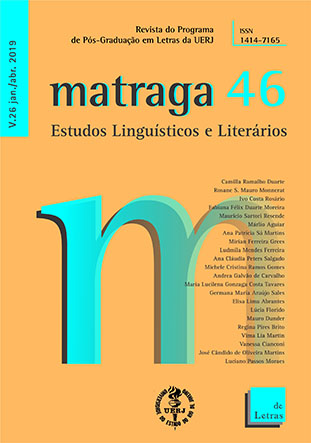Easily erasing history: ‘Orra’, the obliteration of the female voice and the tragedy in madness
DOI:
https://doi.org/10.12957/matraga.2019.37608Keywords:
Oblivion, Joanna Baillie, theater, 19th centuryAbstract
Perversity in the 19th century society goes beyond the simple definition of what is perverse in the dictionary; perversity lied on the oblivion not only of the feminine voice, but on the oblivion of the act of hiding society problems that could be discussed in the English scene. Suppress, hide, take off the stage voices, which had something to say, and erase what could have been presented to the public in order to make them think. Joanna Baillie’s theater tried to be different while argued that the woman, alone, was not prone to a superstitious fear. This article questions the fact that the play Orra: A Tragedy treads a path opposite to what the playwright defended in her theory of the tragedy. When Orra, Baillie’s independent and strong woman, goes mad at the end of the play, she turns herself into the standard 19th century weak woman and the oblivion, in its turn, is a double oblivion: the playwright’s memory in history and her female character.
Downloads
Downloads
Published
How to Cite
Issue
Section
License
Authorization
Matraga – Scientific Journal of the Post-graduate Program in Arts and Humanities of UERJ is authorized to publish the article submitted here, if it is accepted for online publication. It is attested that the contribution is original, that it is not being submitted to another publisher for publication, and that this statement is the expression of truth.
The works published in Matraga's virtual space – Scientific Journal of the Post-graduate Program in Arts and Humanities of UERJ will be automatically transferred, and your copyright is reserved to Matraga. Its reproduction, in whole or in part, is conditional on the citation of the authors and the data of the publication.

Matraga uses license Creative Commons - Attribution-Non-Commercial 4.0 International.





